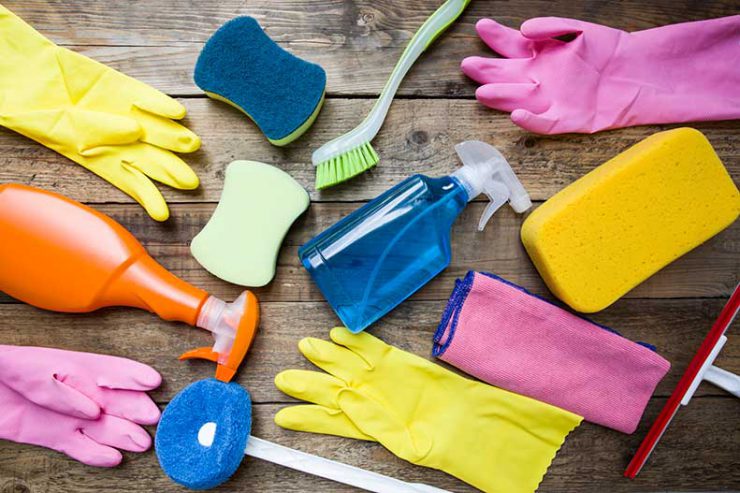Ah, spring. At last, we can open the windows and doors, air out the rugs, and scrub away the dust and dirt of the cold, long winter. Unfortunately, in our excitement to finish chores so we can go outside and enjoy the warmth and sun, and in our determination to do the job thoroughly, we sometimes forget to clean safely.
Here are some tips for safe spring cleaning to keep in mind:
-
“Natural” is not the same thing as “non-toxic”
Many cleaning products are derived from plants, and the majority are relatively safe – provided exposure is small and short in duration. Others, however, such as the common disinfectant tea tree oil, can actually be very dangerous when more than “just a taste” is ingested, especially for small children. If children, pets, or elderly family members with dementia or memory issues reside in your home or visit frequently, it is safer to use products labeled as “non-toxic” rather than “natural.” These non-toxic products should not contain any potentially problematic ingredients (though you should always check the label to verify ingredients).
-
When selecting products for homes with children, select containers with safety caps whenever possible
Keep in mind that safety caps are a deterrent, not a completely preventive solution. Many children do manage to open them, whether purposefully, while playing with them, or if the containers are thrown hard enough. Do not allow children to play with product containers, even if they do have safety caps, and make certain to store all cleaning products out of reach of children. It’s best to keep harmful cleaning products behind a padlock or in a basement behind a locked door. Put Mr. Yuk stickers on all cleaning products and remind your kids that he means, Stop! Don’t touch!
-
Make sure the ventilation is adequate in the space you are cleaning
Never Miss a Beat!
Subscribe to Our HealthBeat Newsletter!
(Tap to Join!)(Click to Join!)I understand that by providing my email address, I agree to receive emails from UPMC. I understand that I may opt out of receiving such communications at any time.Thank you for subscribing!
You can now select the specific newsletters you'd like to receive.
You are already subscribed.
Subscribe to more newsletters in our email preference center.
Sorry, an error occurred. Please try again later.
Get Healthy Tips Sent to Your Phone!
Open windows and sliding doors in the house and/or garage or shed doors if you’re working in those areas. Use fans to help cycle odors out and fresh air in throughout the cleaning process. If you have any respiratory conditions (asthma, chronic bronchitis, or even allergies) or if you are cleaning in areas where children are or will be present, use fragrance-free products to avoid irritating your throat and lungs.
-
Do not mix cleaning products
Mixing acids and bases can cause foaming, and, in extreme cases, explosions. Mixing bleach-containing solutions with other products can result in the formation of irritating gases that cause headaches, coughing, sore throat, and eye irritation. If you have questions about which products would be best for a particular cleaning job, ask a staff member at a home improvement store (many of the larger chains have an online chat function on their website so you can get your answer before you go in). If you use one product and the result isn’t as desired, wash the surfaces thoroughly with water and a small amount of a mild, fragrance-free soap before using additional products. In the case of an accidental spill, wipe excess product up with paper towels or clean rags (wear gloves if your skin is sensitive or if the product is very acidic or alkaline). Then, wash the area with water and a small amount of a mild, fragrance-free soap. Ventilate the area well; even pleasant odors may become overwhelming or irritating when concentrated.
Your local poison center is available at all times to answer any additional questions and to address any poisoning concerns. Call 1-800-222-1222 from a phone with your local area code to contact the correct center.
For more poison-related information, follow Mr. Yuk on Twitter @MrYukPgh and Facebook.
About Pittsburgh Poison Center
The Pittsburgh Poison Center is available 24 hours a day, seven days a week, to provide poison information and respond to emergencies. You can call 1-800-222-1222, 24 hours a day, for emergency help. We answer more than 100,000 calls each year from across Pennsylvania, at no cost to callers. Our staff of nurse specialists has extensive training in clinical toxicology. We also created a network of more than 70 hospitals throughout the state for consultation and follow-up treatment of poison exposure. For nearly 50 years, our symbol Mr. Yuk has helped to educate children and adults about poison prevention and poison center awareness. All stickers of Mr. Yuk carry important poison control phone numbers.
